New Chicago 7 Film Carries Powerful Relevance Today
What year is it?
There are scores of protests over racial injustice and civil rights. There’s rioting and police brutality. A global pandemic kills tens of thousands of Americans. A bitter presidential election featuring a former vice president. Debates over law and order and the limits of free speech.
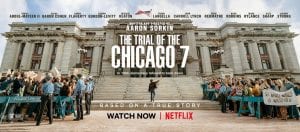
The film covers the 1968 Democratic National Convention in Chicago and the trial that followed the next year.
Of course, you could be talking about this year, with its collision of cataclysmic crises. But that also summarized 1968, which also featured the shocking assassinations of Martin Luther King, Jr., and Robert F. Kennedy, which fed into the massive violence in Chicago during the August Democratic National Convention.
That’s the tense, tumultuous backdrop against which plays the taut, powerful new docudrama, “The Trial of the Chicago 7,” by the always outstanding, articulate Aaron Sorkin. The busy screenwriter/playwright certainly knows his way around a courtroom, and dramatic legal battles.
After all, the 59-year-old Emmy winner (thrice nominated for Oscars for best adapted screenplay) first gained fame in 1989 with his military play, “A Few Good Men,” later made into a film starring Tom Cruise and Jack Nicholson (who memorably faced off in court).
Sorkin’s script for the 2010 Facebook saga, “The Social Network,” centered on a lawsuit against founder Mark Zuckerberg. And he memorably adapted the Harper Lee classic “To Kill a Mockingbird” for Broadway in 2018, with “The Newsroom” star Jeff Daniels as iconic attorney Atticus Finch.
“Chicago 7” also is right up Sorkin’s theatrical alley – lots of dialogue, righteous indignation, moral outrage, clash of cultures and
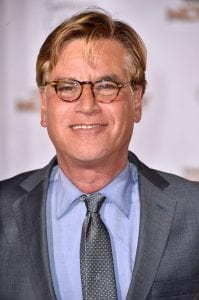
LOS ANGELES, CA – NOVEMBER 17: Screenwriter Aaron Sorkin attends the premiere of Lionsgate’s “The Hunger Games: Mockingjay – Part 1” at Nokia Theatre L.A. Live on November 17, 2014 in Los Angeles, California. (Photo by Frazer Harrison/Getty Images)
generations, clear battle lines and lofty idealism triumphing at the end.
The star-studded Netflix film (just his second as director, after the great, stylish “Molly’s Game” from 2017) includes a pitch-perfect cast, including three well-known Brits taking on three famous American characters.
Sacha Baron Cohen (who has a new “Borat” sequel out this month), 49, plays the social activist Abbie Hoffman, co-founder of the Youth International Party (“Yippies”). Hoffman was 32 at the time of the 1969 trial and offers some much needed humor in this weighty film.
Eddie Redmayne (“The Theory of Everything” and “Fantastic Beasts” films) plays the straight-laced, moral conscience and backbone of the Chicago 7, Tom Hayden. He was a leading ‘60s activist, author and politician – who later won seats in both the California Assembly and California Senate – and was famously married to another anti-Vietnam War troublemaker, actress Jane Fonda, for 17 years.
The renowned English actor, theater director and playwright Mark Rylance also acquits himself with unfussy, good-hearted authority as William Kunstler, one of the defendants’ lawyers in “Chicago 7.” The first artistic director of Shakespeare’s Globe in London, Rylance along with his British compatriots believably bring this legendary American story to thrilling life.
A long journey to the screen
Sorkin told Vanity Fair in July 2020 that he first found out about the planned film during a visit to Steven Spielberg‘s home in 2006, and learned the director wanted to make movie about the subject – the 1968 riots and trial that started in 1969, following the election of Richard Nixon as president (by less than 1 percentage point).
In July 2007, Sorkin wrote the script for “The Trial of the Chicago 7,” based on the conspiracy trial. How could he have known what relevance it would have 13 unlucky years later?
Spielberg had intended to direct, and Cohen was cast as Abbie Hoffman as early as 2007, and the director had approached Will Smith for the role of Bobby Seale (a leader of the Black Panthers), and planned to meet with Heath Ledger about playing Tom Hayden. The Writers Guild of America strike, which started in November 2007 and lasted 100 days, delayed filming and the project was suspended.
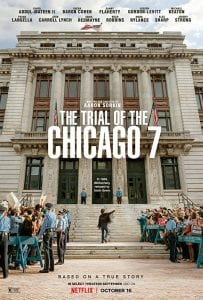
“The Trial of the Chicago 7” is streaming on Netflix.
Sorkin continued to rewrite the script for Spielberg, but the project didn’t progress. In July 2020, Vanity Fair reported that Spielberg had decided to resurrect the film in late 2018, but in October 2018, Sorkin was announced as the director of the film, which was shot in fall 2019.
It is an authentically faithful re-creation of the chaotic events surrounding both the Democratic National Convention and following trial, with Sorkin taking certain dramatic liberties. The film skillfully weaves in some actual TV footage of the events with harrowing reenactments – seeing hundreds of protestors facing off and then violently clashing with police is an all-too familiar vision during this year’s Black Lives Matter movement.
A Grant Park anti-war rally on Aug. 28, 1968, was attended by about 15,000 protesters; other nearby activities involved hundreds or thousands of protesters. After the rally at the bandshell, several thousand protesters attempted to march to the International Amphitheatre (where the DNC was), but were stopped in front of the Hilton Hotel, where the presidential candidates and their campaigns were headquartered. Police worked to push the protesters out of the street, using tear gas, verbal and physical confrontation, and police batons to beat people; protesters retaliated by throwing rocks and bottles, and damaging private commercial property. The police made scores of arrests over several days.
Following the convention on Sept. 9, 1968, a federal grand jury was convened to consider criminal charges. Over more than six months, the grand jury met 30 times and heard some 200 witnesses. President Lyndon Johnson’s Attorney General, Ramsey Clark, discouraged an indictment, believing that the violence during the convention was primarily caused by mishandling of the protests by the Chicago police.
The grand jury returned indictments only after President Richard Nixon took office and John Mitchell assumed the office of Attorney
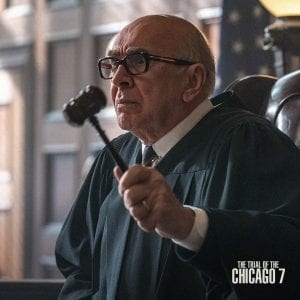
Frank Langella portrays Judge Julius Hoffman.
General; in the film, there’s a chilling scene of Mitchell (John Doman) giving marching orders to the trial’s federal prosecutors, sympathetically played by Joseph Gordon-Levitt and J.C. MacKenzie.
On March 20, 1969, eight protesters were charged with various federal crimes and eight police officers were charged with civil rights violations. David Dellinger, Rennie Davis, Tom Hayden, Abbie Hoffman, Jerry Rubin, and Bobby Seale were charged with crossing state lines to incite a riot, while John Froines and Lee Weiner (who barely make an impression in the story) were charged and later cleared of instructing others in making and using an incendiary device.
When the names of the defendants were mentioned in court, at an early part of the trial, Judge Hoffman (a scarily threatening, impatient, authoritarian Frank Langella) commented about Abbie Hoffman (no relation) — “He is not my son.” In an immediate reply, Abbie called out, “Dad, dad, have you forsaken me?!”
In addition to the government, Judge Hoffman is the obvious villain of the film, showing a bias for the prosecution in his rulings and a dislike of the defense lawyers, making it clear that he disapproved of Kunstler’s long hair, and citing both the attorney and the outspoken defendant Seale (who doesn’t have an attorney present) for many instances of contempt.
According to The Chicago Tribune, it quickly became the trial of the Chicago 7 when “Seale, after loudly disrupting the trial when he could not have the lawyer of his choice, was at first bound and gagged in the courtroom and then severed from the case for a later trial, which never occurred.”
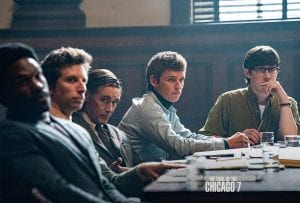
The film features Yahya Abdul-Mateen II (left), Ben Shenkman, Mark Rylance, Eddie Redmayne and Alex Sharp.
Seale – strongly portrayed by Yahya Abdul-Mateen II — asked the trial be postponed so that his attorney Charles Garry could represent him (as Garry was about to undergo gallbladder surgery). While Seale is obnoxious and defiant, it is frightening to see him shackled and gagged while sitting in court.
Kunstler declared, “This is no longer a court of order, Your Honor, this is a medieval torture chamber.” This was referenced in Graham Nash‘s song, “Chicago,” which opened with: “So your brother’s bound and gagged, and they’ve chained him to a chair.” Seale’s case was separated from the rest of the defendants as it was revealed he hadn’t participated in planning for the demonstration, but had gone to Chicago as a last-minute replacement for Eldridge Cleaver, and was only in the city for two days of the convention.
Ultimately, Judge Hoffman severed Seale from the case, sentencing him to four years in prison for contempt of court, one of the longest sentences ever handed down for that offense in the U.S. up to that time. Those charges were soon overturned by the U.S. Court of Appeals, but we don’t learn that in the closing credits, which only refer to Seale’s murder charge dismissed in a 1970 Connecticut case.
Other civil liberties in the film
There’s intense debate in the trial over whether the protestors intended to cause violence, or whether the police were overly aggressive in their response. The film does a wonderful, understated job of reflecting the protestors’ sincere desire to stop the war and killing of Vietnamese.
That year of 1968 saw U.S. troop levels peaking as President Johnson (who didn’t run for re-election) increased forces in Vietnam to 549,500. The year was the most expensive in the Vietnam War with the American spending $77.4 billion ($569 billion in 2020 dollars), with 16,592 U.S. deaths that year.
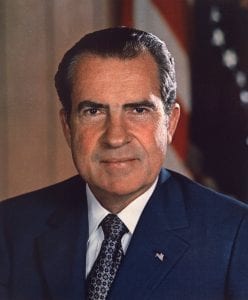
Richard Nixon barely won election as president in 1968 (in a three-way race), then was re-elected in a landslide in 1972.
During the trial (which ran from September 1969 to February 1970), Kunstler and fellow attorney Leonard Weinglass (Ben Shenkman) called a lineup of celebrity witnesses to testify, including Allen Ginsberg, Norman Mailer, Arlo Guthrie, Timothy Leary, and Jesse Jackson. None of that is shown in the movie, though.
A dramatic star turn does take place as they bring in Michael Keaton in a brief, pivotal role as Johnson’s Attorney General, Ramsey Clark (who of course disagreed with Mitchell on the merits of the case). Needless to say, he shines brilliantly, but the courtroom scene is without the jury, in a preliminary vetting process called “voir dire.”
Kunstler asks Clark to recount a call he’d had with then-President Johnson, the details of which completely undermined the case being made by prosecutors.
In one of several instructive comparisons of film versus reality, Mashable.com points out Clark was barred from testifying by Judge Hoffman, which is shown in the film. The movie’s positioning of Clark as a witness who was willing and able to say, essentially, “there’s no case here” isn’t accurate.
According to the court transcript, Clark fielded questions about federal planning and interactions with city leaders ahead of the convention. There’s also a brief discussion of a call the attorney general had with a prosecutor about investigating a particular police action in the aftermath of the convention.
The movie calls out Seale’s indictment as a racially motivated tactic in which a Black defendant was lumped in as a way to “scare” the jury, according to Mashable. Fellow Black Panther co-founder Fred Hampton (Kelvin Harrison, Jr.) reminds him in a noteworthy courtroom moment, the judge repeatedly denied or ignored his intent.
Seale was wrongfully accused and lumped in alongside defendants with whom he’d had virtually no association. Mashable points out the movie’s biggest divergence from reality in terms of Seale is the Black Panthers’ involvement in the trial. The fictionalized take suggests that Seale had support in the courtroom from members of the political organization, including Hampton himself.
“While it’s likely that some members of the Panthers were in attendance, there’s no record in the transcript of Hampton providing material support to Seale during the trial, which earned him an admonishment from Judge Hoffman in the movie,” Mashable wrote.
An emotional peak of the film is when the names of U.S. war deaths (about 4,700 since the trial’s start) were read off in the courtroom, with their ages, but it wasn’t Hayden who did the reading. That causes an uproar (including fury from Judge Hoffman), with most everyone standing and applauding, but in reality Dellinger did the reading.
A nationwide demonstration called the Moratorium to End the War in Vietnam happened on Oct. 15, 1969 in the midst of the trial. Before
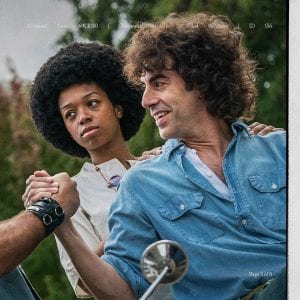
Sacha Baron Cohen (right) co-stars as Yippie leader Abbie Hoffman.
Judge Hoffman arrived and court officially kicked off for that day, Dellinger stood and started reading off the names of soldiers killed in Vietnam.
As in the film, Abbie Hoffman did point out in court that Abraham Lincoln’s 1861 inaugural address might have gotten him in trouble if he’d delivered it in Chicago in 1968, but the part where Sorkin has him quoting from the Book of Matthew appears to be an invention.
In Lincoln’s first inaugural address, the president (also later assassinated in April 1865) said: “This country, with its institutions, belongs to the people who inhabit it. Whenever they shall grow weary of the existing government, they can exercise their constitutional right of amending it, or their revolutionary right to dismember or overthrow it.”
Hoffman reads that quote and notes that revolutionary right takes place every four years. I had a lump in my throat at that moment as well.
It’s more tragic to consider what happened to the charismatic Flower Power leader. After the trial, Hoffman continued working in left-wing causes until 1973, when he was arrested for selling cocaine. He fled, altered his appearance with plastic surgery, and lived in a variety of places under a variety of pseudonyms before settling in upstate New York under the name Barry Freed before resurfacing in 1980.
Hoffman served a year in prison for the cocaine charges and returned to public activism. After despairing at seeing the rise of conservatism and Ronald Reagan in the ‘80s, he killed himself in 1989 at 52, with a drug overdose.
Justice served, justice still waiting
In February 1970, five of the remaining seven Chicago defendants (Hoffman, Rubin, Dellinger, Hayden and Davis) were convicted on the charge of intent to incite a riot while crossing state lines, but none were found guilty of conspiracy.
Judge Hoffman sentenced the defendants and their attorneys to jail terms ranging from two-and-a-half months to four years for contempt of court. In 1972, the convictions were reversed on appeal, and the government declined to bring the case to trial again.
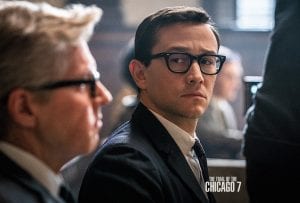
“The Trial of the Chicago 7” features Joseph Gordon-Levitt (right) as prosecutor Richard Schultz.
Despite Vietnam and the Watergate break-in that June, Nixon won re-election in a landslide in ’72 (winning 49 states), defeating Democratic U.S. Sen. George McGovern of South Dakota. Until the 1984 election, this was the largest margin of victory in the Electoral College for a Republican in a U.S. presidential election.
Though it’s not referenced in the film, the global 1968 pandemic was caused by an influenza A virus comprised of two genes from an avian flu virus. It was first noted in the United States in September 1968. The estimated number of deaths was one million worldwide and about 100,000 in the U.S.
Seeing the ruckus caused by the reading of names and ages of war victims in the movie caused me to wonder, where has a similar widespread sense of national outrage been over the death of nearly 220,000 Americans from Covid-19? How long would it take to read those names – alone 3.8 times greater than the total number of Americans killed in Vietnam over 10 years?
In my rough estimate (3 seconds per name/age), it would take 183 hours.
Like many of Sorkin’s forceful works, “The Trial of the Chicago 7” has a passionate, political point of view. It’s not necessarily pro-Democrat or Republican, but simply on the side of being active, informed, and caring about our democracy and the life of a civil society.
I can never forget the caustic Sorkin speech “Newsroom” anchor Will McAvoy (Daniels) made in response to a college student’s question in its first episode in 2012, why America is the greatest country in the world.
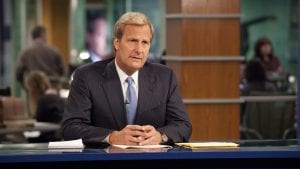
Jeff Daniels starred as anchor Will McAvoy in Aaron Sorkin’s “The Newsroom.”
“Just in case you accidentally wander into a voting booth one day, there’s some things you should know. One of them is: there’s absolutely no evidence to support the statement that we’re the greatest country in the world,” he said then. “We’re 7th in literacy, 27th in math, 22nd in science, 49th in life expectancy, 178th in infant mortality, 3rd in median household income, number 4 in labor force and number 4 in exports. We lead the world in only three categories: number of incarcerated citizens per capita, number of adults who believe angels are real and defense spending, where we spend more than the next 26 countries combined, 25 of whom are allies.”
Have you ever heard Donald Trump make a speech like that? Will in “The Newsroom” also aspired to make America great again, as we were at some point:
“We stood up for what was right. We fought for moral reasons,” he said in that same speech, maybe even more timely now. “We passed laws, struck down laws, for moral reasons. We waged wars on poverty, not on poor people.
“We sacrificed, we cared about our neighbors, we put our money where our mouths were and we never beat our chest. We built great, big

The film covers the 1968 Democratic National Convention in Chicago and the trial that followed the next year.
things, made ungodly technological advances, explored the universe, cured diseases and we cultivated the world’s greatest artists AND the world’s greatest economy. We reached for the stars, acted like men. We aspired to intelligence, we didn’t belittle it. It didn’t make us feel inferior. We didn’t identify ourselves by who we voted for in the last election and we didn’t scare so easy. We were able to be all these things and do all these things because we were informed.”
Like great journalists and writers, Sorkin seeks to inform and spur people to action.
That also was evidenced by the recent premiere on HBO Max of his Democratic White House fantasy – a recently filmed, staged episode of “Hartsfield’s Landing,” from the third season of “The West Wing,” which first aired in February 2002.
Then, an idealistic network drama about politics doing good in the world could still be a Top 10 show, averaging over 17 million viewers an episode. A New York Times piece noted the new staging (in an empty theater) was to benefit the nonprofit group When We All Vote. “But it couldn’t help seeming like the prying open of a time capsule,” the Times said.
“It’s not alone, however, in trying to fit in one last civics lesson before the polls close. It joins several stage works arriving on TV — a hip-hop musical, a furious feminist read of the constitution, a quirkily political theatrical concert — that are framing the anxieties of 2020 within the pop culture of the last two decades.”
So a lesson from The Book of Aaron – get educated, care, play a part, raise your voice, and vote.




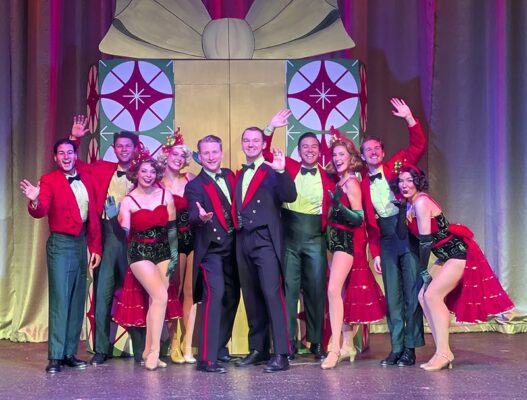
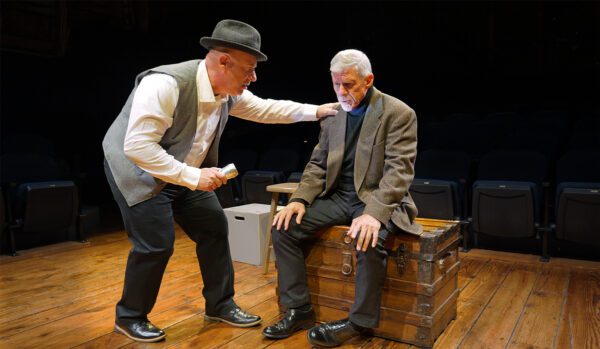







Leave a Reply
You must be logged in to post a comment.